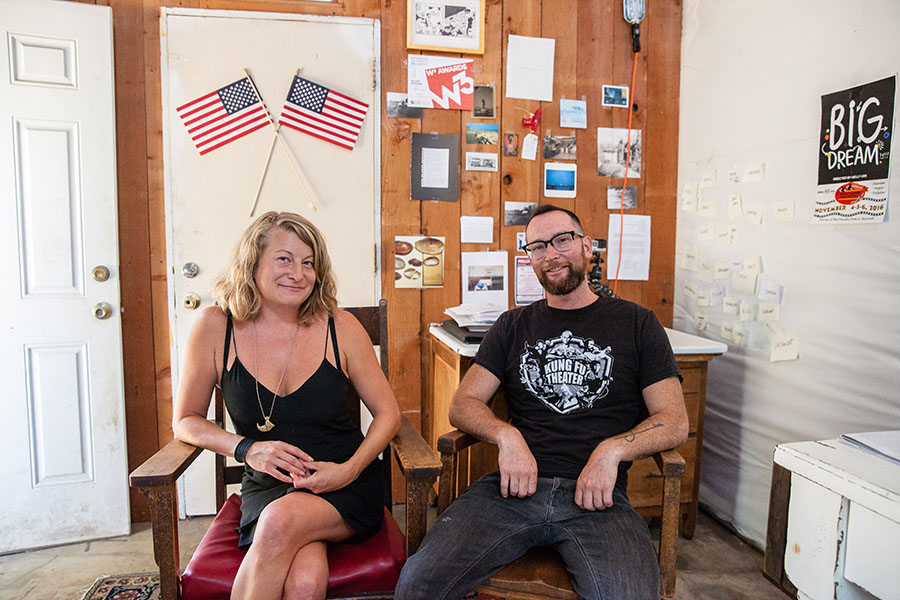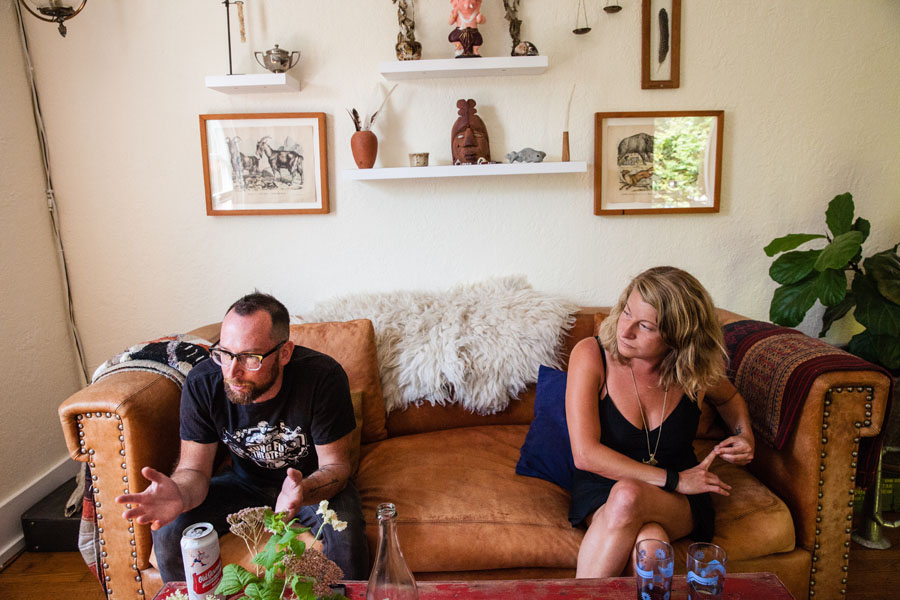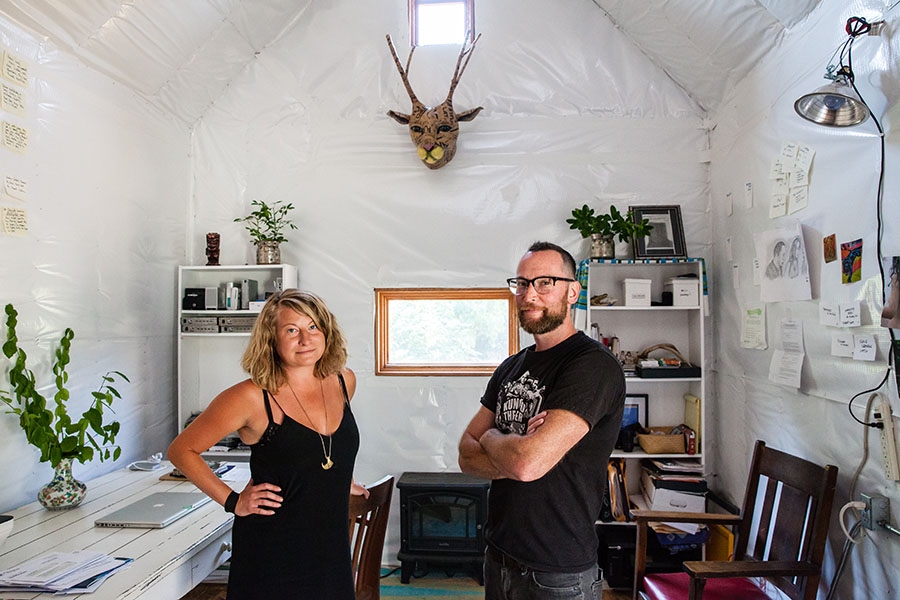Husband-and-wife filmmakers narrate the faults and foibles of the creative class.
There is no air conditioning inside the mother-in-law unit that houses the studio for Iron Way Entertainment, so co-founder Kelly Cox meets me in the living room of her Northeast Portland home with a bottle of plum cider.
The space is cooler, the cider is tart and refreshing, and the scene is apropos: Cox’s PBS food show, “Original Fare,” focuses on the farm- and forest-to-table origins of foodstuffs around the world.
She produced the Elderberry Perry cider in partnership with Oregon cider company Wildcraft.
Iron Way, a small commercial film company she runs with husband Lucas Longacre, has had its ups and downs since Cox joined the business in 2010. That year, the studio pulled in roughly $1 million thanks to clients like the Cisco and the U.S. Open.
But since then, revenues have dropped by half every year.
“The pricing structure has changed dramatically,” says Cox, 35. “Technology is cheaper, so a lot of junior producers have come into the business and underbid us.”
The cider, bottled and sold to Portland venues, is a new venture fueled by “desperation for more money,” she says, laughing.
“This is why you make art: to make people feel a little bit uncomfortable, get them outside of their comfort zones and have these conversations.”
Like many young creatives, Longacre and Cox are at once immersed in and critical of 21st-century urban culture: the artisanal fetish, ubiquitous social media, the cult of the chef.
Their new projects, which supplement and diversify Iron Way’s services, capture the duality.
Thus “Original Fare” eschews dolled-up celebrity chef programming in favor of a harder-core, feminist-tinged realism.
Longacre himself is working on a short film, “Food Cart,” a spoof of foodie culture slated for release this fall.
The satire chronicles the plight of an Iranian immigrant who works long hours in a Portland restaurant in order to bring his father to the United States.
Both Longacre and Cox hope to revive what they claim is the lost art of narrative. “What’s getting lost is a point of view,” says Longacre, referring to Instagram and Snapchat quick-hit communication modes. “It’s all just: ‘How do I grab whatever I can and kick this stuff out?’”
Sipping her cider, Cox laments a “like”-obsessed audience. “I hate to see our culture lose the importance of story,” she says.

Cox knows from story. Quick-witted and sarcastic, she grew up in Napoleon, Missouri, population 200, where “you’re educated to be a farmer and a racist, and to learn your Bible verses,” she says.
After getting kicked out of high school because she “broke bad,” Cox absconded for New York City to pursue a writing career.
Thirty-nine-year-old Longacre, bearded and wiry, is the more earnest and genial of the pair.
He grew up in Long Island — “We’re the cousins of trashy Jersey,” as he puts it — in a town that bordered peach and apple orchards, before attending the University of Buffalo, a school that would get him as far away from home as possible while still allowing him to pay in-state tuition.
Longacre’s goal was to head west and become a writer, director and producer. It was the early aughts, and New York City was booming with jobs in the film business. At 26 he launched a daily-hire production company finding crews for reality television shows.
Meanwhile, Cox, after “cleaning dog shit off the SoHo cobblestones” for a nightclub owner, was working her way into the world of environmental nonprofits. She eventually landed a social media job at the National Resources Defense Council.
The two met in New York, after Cox recruited Longacre to work on a pre-Facebook project aimed at engaging young people on the subject of climate change.
The pair traveled the country interviewing musicians about global warming, then produced a series of clever MySpace videos about environmental awareness for the NRDC.
One of the clips, about an office zombie who doesn’t eat people but inconsiderately drinks coffee from disposable cups, garnered 2 million views in the first week.
“That for me was a wake-up call,” says Longacre, who founded Iron Way in 2006. “The web was it. This was the place to be.”
Projects for Disney and Microsoft followed, and in 2015, the couple moved to Portland.
In 2013 Iron Way’s food show “Original Fare” caught a big break after Cox met producers from PBS at a food conference.
The public television station liked the pitch — the show documents Cox’s endeavor to “hunt, forage and farm her way across the globe in search of the best ingredients our planet has to offer” — and agreed to license a few episodes.
Portland has a long tradition of tough women making a name for themselves in a male-dominated food scene — Portland Meat Collective’s Camas Davis, for one; and Beast’s Naomi Pomeroy for another. Cox follows their path.
“There’s no show out there that has people cutting chickens’ heads off, smoking, cussing and drinking,” she says. “My show isn’t about chefs; it’s about people who bring food to the table. I want to use this medium to push the boundaries.”

In an episode titled “Campside Clams,” Cox can be found reaching her arm deep into a thick soup of Bodega Bay, emerging with a clam and proclaiming, “I’m pissed. He wasn’t as big as I wanted him to be.”
In that same episode, she tells viewers that women on television have been “relegated to cooking shows and looking pretty. We’ll get out to the places that create real food with real folks.”
Longacre’s film “Food Cart,” which he co-wrote with local beekeeper Damian Magista, skewers other aspects of the on-trend dining industrial complex.
The show pokes fun at the Rose City’s reverence for chefs, many of whom Longacre claims as friends. He hopes it will provoke discussion about cultural appropriation in the restaurant world — a hot-button issue in Portland and around the country — and to tell the stories of minorities who work behind the scenes in some of the industry’s toughest and underhyped jobs.
“This is why you make art,” Longacre says, “to make people feel a little bit uncomfortable, get them outside of their comfort zones and have these conversations.”
Count Longacre as one of the discomfited.
He was surprised when several of his white friends in Portland suggested his script might reinforce stereotypes about race. Longacre declined to reveal “Food Cart” plot elements, saying only, “it’s about a person’s fall from grace.”
But the film tells a nuanced story, he insists.
“I liked watching “Breaking Bad” because I empathized with a lead character who’s not a good person,” he says. “I try to pull it off by saying, ‘We’re all to blame here.’”

Iron Way and Original Fare separated into two entities in 2017. Original Fare had started to turn a profit, Cox says, and as Iron Way began to diversify, she realized it was time to separate operations.
Under the Iron Way umbrella, Longacre has rebranded as a consultant to advertising agencies. He also hopes “Food Cart” will help establish his credentials as a fiction writer and has already written another script, about Cox’s childhood in small-town Missouri. It’s a noir-ish tale rife with “murder, embezzlement, blackmail, all these crazy stories based on real things that happened in this town she grew up in,” Longacre says.
Cox says she hopes PBS will keep her boundary-pushing show alive in the Trump era.
“They’re very scared, and I want to do a lot more hard-hitting content,” she says. “But I don’t know if there’s another network out there for me. I’m not sure where it’s going to go.”
To cover her bases and make the mortgage, she’s developing yet another food product: a hot sauce derived from peppers and mezcal she brought back from a film shoot in Oaxaca. The product is a partnership with Marshall’s, a Portland business.
But wait: Isn’t this the kind of artisan tinkering “Food Cart” might spoof?
Cox and Longacre are eager to make good on the promise of present-day social entrepreneurship and idealized consumerism: sell their own creative ideas and products while providing a counter-narrative to a culture that prizes “likes” over meaningful engagement.
Oh, and add in issues of race and class while mining authentic experience.
But critiquing corporate culture and the culture industries is a tall order — and Cox and Longacre know it.
In their career trajectories, financial struggles included, one reads the latest chapter in the evolution of that singular, self-aware species: the modern-day metropolitan creative.
Corrections appended: This article has been modified to account for several factual errors. The cider mentioned in the first paragraph was not brewed by Cox, and the plums did not come from her backyard. The cider was made by Wildcraft, a local cider company. Cox and Longacre moved to Portland in 2015, not 2011, and Iron Way did not work for Nike or Microsoft. Iron Way and Original Fare became separate entities in 2017.



